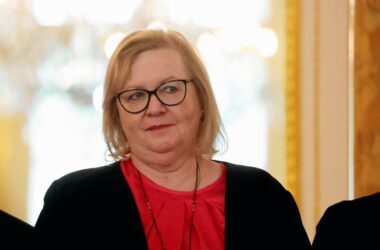No money will be paid to beneficiaries until contracts are verified for compliance with HoReCa rules, declared Katarzyna Pełczyńska‑Nałęcz, underscoring tightened measures and higher oversight of the KPO program.
Controversy about KPO. Pełczyńska‑Nałęcz: The program has been tightened, not loosened
At the beginning of the Tuesday press conference, Katarzyna Pełczyńska‑Nałęcz stressed that the HoReCa program was incorporated into KPO under the PiS government. “This program has been tightened, not loosened,” she said. “We introduced a one‑year moratorium on the purchase of durable goods. Why a year? Because all investments from the grant part must finish by 26 months. If KPO had begun earlier, or if this program had been implemented earlier, that moratorium could have been longer. That decision was introduced in the first place.” She added that initially there was no moratorium period in the program. The minister also addressed the criticized reduction of the turnover‑decrease criterion during the pandemic that entitled companies to subsidies. The requirement was lowered from 30% to 20%. “This was not a loosening, but a normal procedural measure,” she said. In the first call, a high threshold of 30% was set. Then, because the indicator was not met, the next call lowered the threshold to 20% loss of turnover. “This is normal, standard, and necessary action within KPO,” the minister explained.
Suspension of payments
The minister informed about “quick and wide” control actions. The controls concern the Polish Agency for Enterprise Development and the units that directly granted subsidies. “Today I decided that no funds will be transferred for payouts to beneficiaries until the contract is inspected and deemed compliant with HoReCa rules,” she said. She noted that 110 million PLN had already been paid to beneficiaries and that the total program value is 1.2 billion PLN. “We have suspended these funds. They will be paid as controls progress,” she added.
Resignation of PARP head
Pełczyńska‑Nałęcz also referred to the dismissal of the PARP head. She said the decision was taken due to “ineffectiveness, delayed actions, not only regarding HoReCa, but also other programs.” “I did not bring this to public attention because I did not want to cause personal or reputational harm to a person who failed in that role,” she said. “It was not related to these specific irregularities. There were numerous complaints from HoReCa beneficiaries about cooperation with PARP.”
Funds for MP’s wife. “I am purely morally outraged by this situation”
The minister was asked by a journalist whether she saw a conflict of interest in providing a grant to the wife of a Sejm MP. No MP’s name was named during the conference, but the case was presumably about funds granted to the wife of Artur Łącki from the KO. “I am purely morally outraged by this situation,” she said. “But as a minister I must act according to the rules. These are huge sums and cannot cast a shadow that something has happened from my side or from anyone in the ministerial staff, meaning that someone among us intervened in any procedural matters from a political key. And the procedures are strictly defined; there is no possibility to enter a clause into the regulations of any call that reads ‘do not grant to party‑affiliated employees’ or ‘do not grant to employees whose spouse, mother, father have party affiliation’. Those are unacceptable provisions in any EU fund call, so there are no such provisions, hence no basis for enforcement. My political intervention is excluded, because that would mean I politically interfered in procedural decisions. That must not be done – that is the worst possible practice.”
More on the KPO affair can be read in the article “KPO scandal. Vice‑Minister Karnowski: It was so rushed that it would be hard to stop”
The link to the article is provided.










